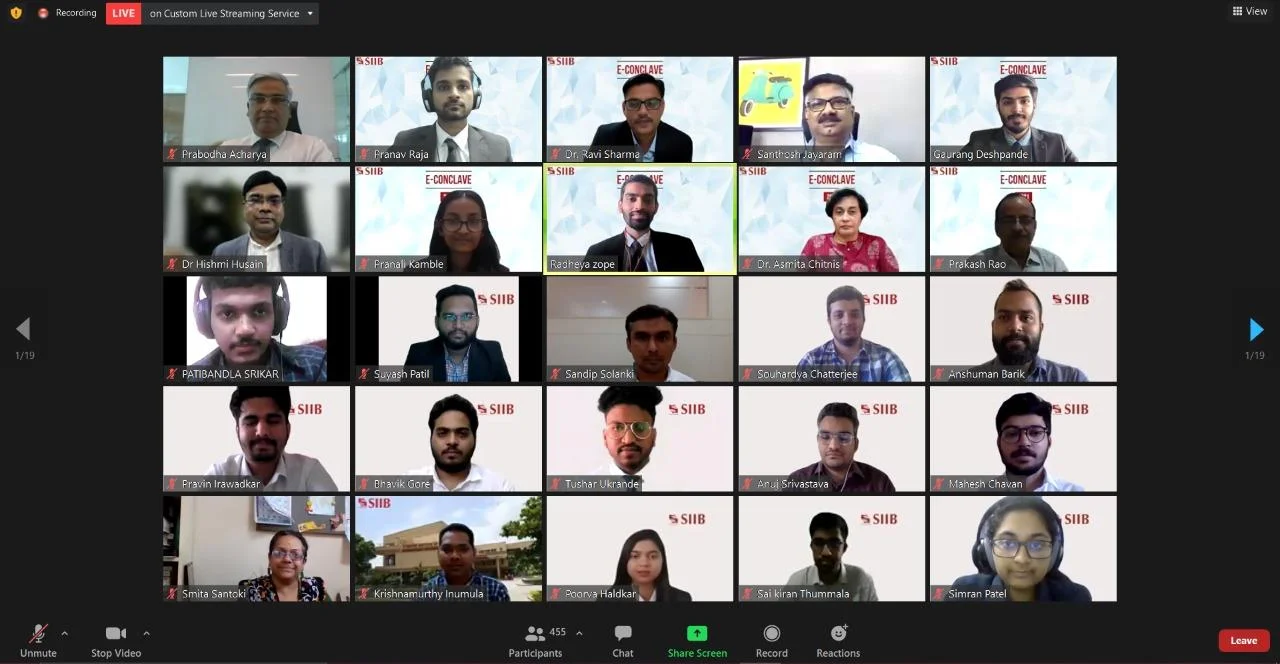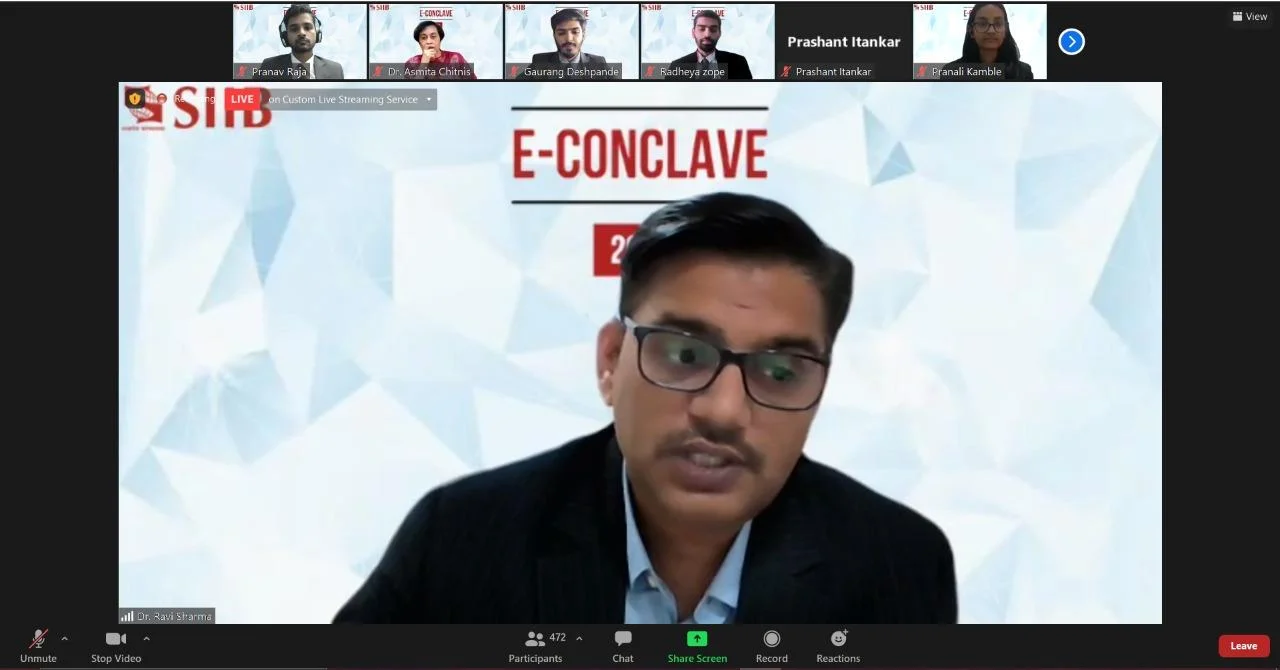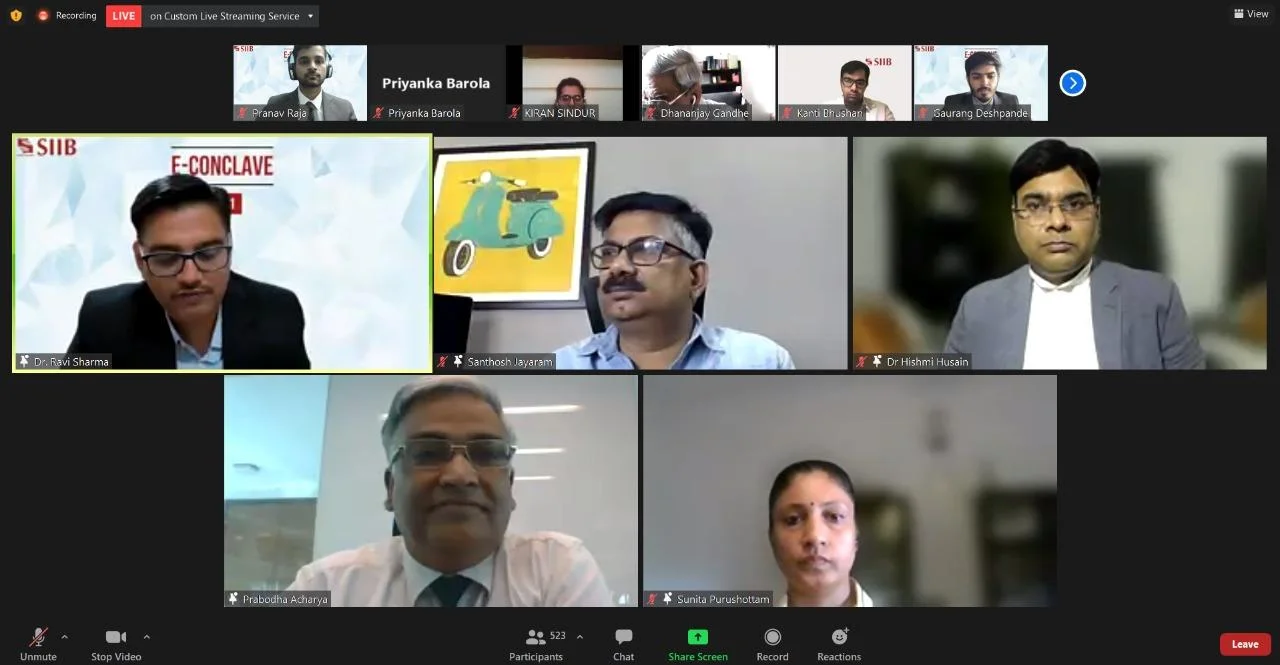ECONCLAVE REPORT – DAY 2, SESSION 2
Date of Conduct: 22nd October 2021
Time: 02:00 PM – 04:00 PM
Speakers’Names and Designations:
Panellists:
Mr. Santosh Jayaram, Global Head Sustainability, HCL Technology
Mr. Prabodha Acharya, Chief Sustainability Officer, JSW
Dr. Hishmi Jamil Husain, Head, Biodiversity & Corporate Sustainability, TATA Steel
Dr. Sunita Purushottam, Head, Sustainability, Mahindra Lifespaces
Moderator:
Dr. Ravi Sharma, Assistant Professor, SIIB
No. of Students present: 530
Synopsis
Dr. Ravi Sharma started the session by refreshing our memory of how pollution had drastically decreased during the lockdown and had begun increasing when everything began opening up. Dr. Ravi Sharma also stressed how the functioning of the economic ecosystem got affected. Thus, humanity tried to balance the adverse environmental and social aspects because of it. He further gave his views on how we have crossed the tipping point of sustainable equilibrium. Dr. Ravi Sharma then concluded that one should now focus on investing in sustainable business, biodiversity conservation, and sustainable social infrastructure.
Our first speaker of the session, Mr. Santosh Jayaram, proceeded straight to the point that the time for talking is over and how earlier sustainability was linked only to goodwill and helping out socially, but post covid something changed forever. We are witnessing a significant shift that is money has started sustainability, and as a result, regulations began to fall into place. To provide students some perspective, Mr. Santosh presented astounding figures on how ESG investing is the way ahead and how consistently it outperforms others. He also shed some light on the regulatory framework in Europe and India and how it is very stringent to avoid fraud and greenwashing. Mr. Santosh concluded his dialogue by discussing the three main directions: Promising Innovation, Accountability/Liability around sustainability, and Traceable Future.
Mr. Prabodha Acharya was our second speaker for the session and initiated by stating how industrialization has had drastic implications on the world and became more apparent in the last two years because of Covid-19. He then spoke about the manufacturing of steel and the fact that it is a resource with zero diminishing value because of its recyclable property. Due to this infinite recyclable property, steel will be critical in driving the green economy and net-zero emissions. Mr. Acharya emphasized that the steel industry is a very energy-intensive and emissive sector, and only a tenth of the GDP is required to clean this industry. His presentation showed us why JSW is one of the pioneers of sustainability and showed us a perfect example of the circular economy by manufacturing green cement and paver blocks using slag as raw material.
Dr. Hishmi Jamil Hussain began the session by mentioning how proper biodiversity monitoring is paramount as the future is unpredictable. Dr. Hishmi gave some examples of devastating floods and climate events of 2021 in several parts of India. He mentioned that transformative changes are needed to restore and protect nature as thousands of species will extinct. Dr. Hishmi then threw some light upon the emerging trends in the biodiversity segment—the drastic reduction in the bee population serving as a prime example where bees predominantly do cross-pollination. With continuous overexploitation of the earth’s natural resources, biodiversity was bound to get exploited. He provided valuable insights on how climate has affected biodiversity with the global risk factors that state Infectious diseases are in the top spot followed by climate action failure. Dr. Hishmi Jamil Hussain concluded with scenarios such as reclamation of a mined-out area in West Bokaro and CRM Bara Ash Pond rejuvenation in 2020.
Dr. Sunita Purushotham was the final panelist of the session and started by stating how unfortunate it was that the world has come to a stage where sustainability professionals are necessary as over-exploitation and negligence in the environmental parameters has made companies hire such professionals. Dr. Sunita stressed that students need to understand the importance of sustainability as the world needs them.
Dr. Sunita began during her presentation and mentioned that the global climate change perspective affects human life in different ways as the world is increasingly susceptible to many climate change activities. She stated that the built environment, consisting of Building operations and Building Materials, is more than 50% of the global CO2 Emissions by Sector.
Further, Dr. Sunita spoke a few points on inefficient Buildings, which consist of French windows and glass, have no orientation in cities like Pune and Bangalore. Meeting the 1.5° C Paris Agreements in the Global Environment and Temperature should be optimal for the highest production. The working conditions would be difficult as the temperature rises, and there will be a hike in demand for cooling in hot countries. Buildings are designed to provide comfort using the least amount of energy possible, aligned to the sun and climate of the region. Design for “least possible air-conditioning and artificial lights during the day.”
Then she compared the Residential building in the past and now in the present with points like the increase in glazed area Ventilation propagations and the climate responsive designs to be the trend in the foreseeable future. She also stressed that hardly any institution in India focuses on the energy aspect of building at the design stage, and we students of Energy and Environment have the job cut out for us. She concluded the session by explaining that applying renewable energy to inefficient buildings is not the right approach with visualization on Passive Design Strategies.
Student Feedback:
“The entire session was very informative and gave us in depth insights about various aspects of Sustainability. I thank all the panel members who provided us with all the trends and developments and will help us progress in our careers as Sustainability executives.”
-Dhiren Patil, MBA Energy and Environment 2021-2023.
Overall Feedback
We students of Energy and Environment were fortunate enough to interact with industry stalwarts in the sustainability sector, and this session gave us the much-needed perspective. Students found this session a glimpse into the future and a direction to take their careers forward in sustainability and energy.
Pictures:





